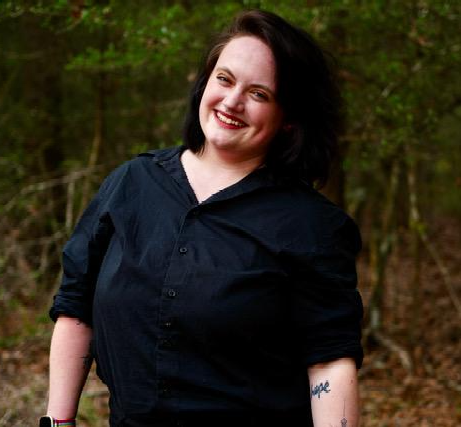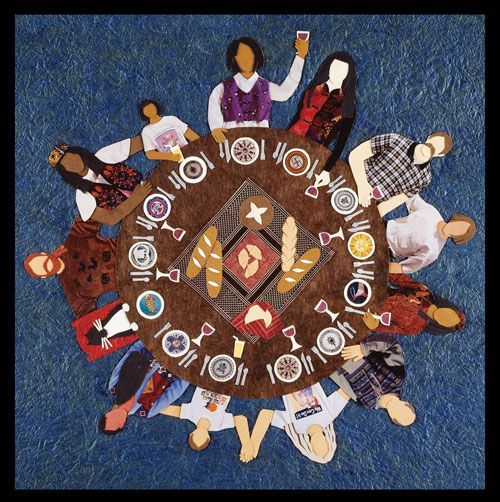How Do We Embody Love
Beloved Community, We Are Called to Love
Breath Prayer:
Inhale: "Send me, Lord."
Exhale: "To love as you love."
This past Monday, St. Matthew's and Sustainable Renton submitted a significant grant application to the Washington State Department of Commerce to install solar panels on our church building and upgrade all of our single-pane windows to energy-efficient ones. As I worked through the grant application, I found myself overwhelmed with gratitude as I reflected upon the fact that St. Matthew's hosts over 15 nonprofits who use our building to care for our neighborhood. In the grant, we were able to lift up that St. Matthew's is truly a community hub where people receive direct care, nourishment, healing, connection, social services, mental health care, and numerous opportunities for spiritual growth. An additional 17 nonprofits depend upon food that Sustainable Renton gleans on a regular basis. Our partnerships and our intentional care for our neighbors speak volumes about how we long to embody Jesus' mission from Luke 4, "to bring good news to the poor, to proclaim release to the captives and recovery of sight to the blind, to let the oppressed go free, and to proclaim the year of the Lord's favor."
For St. Matthew's, embodying love looks like hosting a Dia de los Muertos celebration (thank you Aidé and Gabe Gutierrez!) where everyone is invited to share stories of loved ones and delight in a culturally rich feast of food and connection. Embodying love looks like providing weekly food boxes to vulnerable families. Embodying love looks like attending to grieving families and offering compassionate care whether they are a members of the community or not. Embodying love looks like middle school students at the after school program getting a home cooked meal. Embodying love looks like a young man walking into our narthex, seeing the rainbow banner and saying, "I think I am home."
And embodying love also means using our voices when our siblings are under attack. That's why Pastor Rachel and I joined 48 other rostered leaders in the Northwest Washington Synod to read a letter speaking out against hate, the weaponization of religion, and increased violence against vulnerable members of our communities. Just as our building becomes a place of refuge and care, our voices and bodies can be instruments of protection and solidarity.
Here is the video you can watch! https://www.youtube.com/watch?v=jLiasl1QLEc
The letter that follows is the manuscript of the video. It is one more way we seek to embody Christ's love, not just within our walls, but in the public square, standing with and for those whom society seeks to exclude or erase. As you read or watch this witness, I invite you to consider: How is God calling you to embody love today?
_________________________________
Grace and peace to you in the name of our Lord and Savior, Jesus Christ.
As ministers serving in the Northwest Washington Synod of the Evangelical Lutheran Church in America, we affirm the words of 49 of our Synod bishops throughout the United States of America. Those bishops wrote in this moment of national and global tension with clarity and conviction. Their faith, and our faith, compels us to stand where Jesus stands—with and for those whom society often seeks to exclude, erase, or diminish. Here are their words, which we affirm, support and echo:
Our shared confession that every person is created in the image of God (Genesis 1:27) grounds us in the conviction that all people possess inherent dignity. The incarnation of Jesus Christ reveals God’s profound solidarity with humanity—especially with those who are marginalized or oppressed. The gospel we proclaim insists that our neighbor’s need is the occasion for our love and that our public life is shaped by justice, mercy, and a commitment to the common good.
Further, we have a shared tradition in our social teachings which grounds us. The ELCA’s Social Message on Immigration reminds us:
“We are to respond to newcomers as we would to Christ—welcoming them, meeting their immediate needs, and advocating for justice in our laws and policies.”
Likewise, our recently adopted Social Statement Faith and Civic Life affirms that Christians are called to be “a public witness, holding leaders accountable when they fail to protect the vulnerable.”
We are living through a time when vulnerable communities are being scapegoated and attacked. Immigrants and refugees are vilified, though Scripture commands us to welcome the stranger. People of color continue to bear the devastating weight of racism woven into the fabric of our society. Transgender people, beloved by God, are being targeted with laws and rhetoric that deny their dignity and even their right to exist. These assaults on our siblings are not political abstractions—they are deep wounds in the body of Christ.
In this time of division and fear, we, as people grounded in our faith, insist on love.
This commitment flows from our faith in Christ crucified and risen—the One whose love breaks down barriers, confronts hatred, and transforms hearts.
Love insists on the dignity of every human being.
Love insists on justice for the marginalized and oppressed.
Love insists that the church must reflect God’s diverse, life-giving community.
Love insists that we listen, speak, and act with respect, even in disagreement.
Love insists on hope, trusting that God’s kingdom of justice and peace will prevail.
This love also compels us to speak clearly against Christian Nationalism, which our Churchwide Assembly named as a distortion of the Christian faith and an unhealthy form of patriotism. Christian Nationalism confuses the Gospel with political power, turns God into a mascot for the state, and privileges some people over others based on race, religion, or birthplace. This is not the way of Jesus. The kingdom of God is not a nation, not a culture, not a political ideology—it is God’s reign of love, justice, and mercy for all people.
Therefore, as pastors, deacons and rostered leaders of this church, we declare that the Evangelical Lutheran Church in America and all people of faith cannot be silent. Our call is clear:
• To proclaim the God-given dignity of every human being.
• To resist systems and ideologies, including Christian Nationalism, that oppress, dehumanize, or erase.
• To stand shoulder to shoulder with those who are targeted or harmed.
• To bear public witness that the love of Christ is stronger than fear, stronger than hatred, and stronger than death.
We call on all members of the ELCA to join us in prayer, advocacy, and action:
• Pray for those who are vulnerable and for all who work for justice.
• Advocate in your communities, legislatures, and Congress for laws that protect migrants, advance racial justice, and safeguard LGBTQIA+ people.
• Engage in the holy work of hospitality, creating spaces of safety, affirmation, and belonging for all God’s children.
• Model respectful dialogue in a polarized world, seeking understanding rooted in love.
• Hold fast to hope, trusting that the Spirit is still at work renewing creation and reconciling the world to God.
In baptism, we are marked with the cross of Christ forever. That cross is not only a sign of our hope—it is also a summons to follow Jesus into solidarity with those who suffer.
In the power of the Spirit, let us be bold. Let us be faithful.
Let us Insist on Love—in our words, our actions, our public witness, and our life together. Amen.
In God's Peace and Embodied Love,
Pastor Kacey





